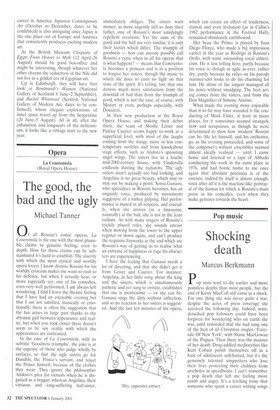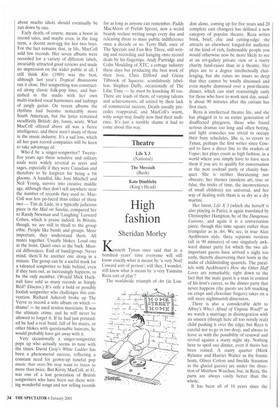Shocking death
Marcus Berkmann
Pop stars tend to die earlier and more pointless deaths than most people, but the end of Kirsty MacColl still came as a shock. For one thing she was never quite a star, despite the acres of press coverage she received the following day. Indeed, semidetached pop followers could have been forgiven for wondering who on earth she was, until reminded that she had sung one of the best of all Christmas singles, 'Fairytale Of New York', with Shane MacGowan of the Pogues. Then there was the manner of her death. Drug-addled mediocrities like Kurt Cobain polish themselves off in a haze of adolescent self-hatred, but it's the genuinely talented songwriters who lose their lives protecting their children from arseholes in speedboats. I can't remember a pop death that left me feeling more numb and angry. It's a fetching irony that someone who spent a career writing songs
about macho idiots should eventually be run down by one.
Early death, of course, means a boost in record sales, and maybe even, in the long term, a decent nest-egg for her two boys. For the fact remains that, in life, MacColl sold few records. Her seven albums were recorded for a variety of different labels, invariably attracted good reviews and made no impression on the wider public at all. I still think Kite (1989) was the best, although last year's Tropical Brainstorm ran it close. Her songwriting was constructed along classic folk-pop lines, and burnished in the studio with her own multi-tracked vocal harmonies and lashings of jangly guitar. On recent albums the rhythms had become noticeably more South American, but the lyrics remained steadfastly British: dry, funny, acute. What MacColl offered above all was a fierce intelligence, and there aren't many of those in the music industry. It's a sad loss, which all her past record companies will be keen to take advantage of.
Who'd be a singer-songwriter? Twentyfive years ago these sensitive and solitary souls were widely revered as seers and sages, especially if they were Canadian and therefore to be forgiven for being a bit gloomy. A handful, like Joni Mitchell and Neil Young, survive into creative middle age, although they don't sell anywhere near the number of records they used to. MacColl was less p0-faced than either of these two — Tim de Lisle, in a typically judicious piece in the Mail on Sunday, compared her to Randy Newman and 'Laughing' Leonard Cohen, which is praise indeed. In Britain, though, we are still in thrall to the group ethic. People like bands and groups. More important, they understand them. All mates together. Usually blokes. Loud one at the front. Quiet ones at the back. Musical. differences. End of band/group. Never mind, there'll be another one along in a minute. The group can be a useful mask for a talented songwriter to hide behind, even if they turn out, as increasingly happens, to be the only member. (Would Mick Hucknall have sold as many records as Simply Red? Discuss.) It's only a bold or possibly foolish songwriter who challenges this convention. Richard Ashcroft broke up The Verve to record a solo album on which — shame! — he used session musicians. It was the ultimate crime, and he will never be allowed to forget it. If he had just pretended he had a real band, full of his mates, or other blokes with questionable haircuts, he would probably have got away with it.
Very occasionally a singer-songwriter pops up who actually seems in tune with the times. David Gray's White Ladder has been a phenomenal success, reflecting a constant need for grown-up tuneful pop music that over-30s may want to listen to more than twice. But Kirsty MacColl, at 41, was one of a lost generation of British songwriters who have been out there writing wonderful songs and not selling records
for as long as anyone can remember. Paddy MacAloon of Prefab Sprout, now a weird beardy recluse writing songs every day and releasing them to mass public indifference once a decade or so. Terry Hall, once of The Specials and Fun Boy Three, still writing and recording and hanging onto record deals by his fingertips. Andy Partridge and Colin Moulding of XTC, a cottage industry these days but producing the best work of their lives. Chris Difford and Glenn Tilbrook of Squeeze, scandalously labelless. Stephen Duffy, occasionally of The Lilac Time — he must be knocking 40 too. There are loads of them, of varying talents and achievements, all united by their lack of commercial success. Death usually precedes reappraisal, and MacColl's warm, witty songs may finally now find their audience. It's just a terrible shame it had to come about this way.



















































 Previous page
Previous page